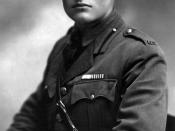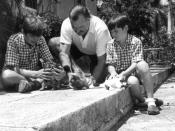'The times, they are a changing,' famous words spoken by Bob Dylan, a king of his generation. 'Lost generations,' is an interesting phrase, but what kind of meaning should it hold? Ernest Hemingway's In Our Time is a true representation of a 'lost generation' for the simple reason that all generations are eventually lost as time goes by. Hemingway focuses on a generation he knows a great deal about- his own. It becomes apparent throughout the novel that Hemingway is trying to give the reader a feel for what times were like(or at least what he wanted or perceived them to be like) and knowingly or maybe even somewhat inadvertently conveys a message about the time period in question. All of the 'messages' bring the reader to an understanding of a generation, the 'lost generation' that appears to result from Hemingway's novel.
Ernest Hemingway uses intense short stories to leave a feeling of awe and wonder in the reader of In Our Time.
One begins to become emotionally involved and attached to Hemingway's many stories, just as he himself appears to hold some personal attachment and emotion to each story. One could even speculate that In Our Time's main character Nick, is in fact, Hemingway himself. It seems as though no matter what age this novel is read at, it could be discussed as a representation of the 'lost generation.' What is meant by the phrase 'lost generation?' Possibly it means the loss of a kindlier, friendlier, period of time. Maybe it means a loss of familiarity, closeness and strength of relationships; everyday things like the lost art of conversation. But at the same time, the characters in the stories appear to be part of a 'lost generation' themselves. In 'The Three- Day Blow,' Nick and Bill spend a leisurely...


